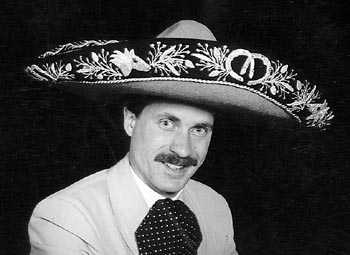Mariachi Merger
Americano embraces Mexican music, teaches others to do the same
By Cecily Barnes
SUITED IN A SNUG-FITTING traje de charro, Jonathan Clark stands on stage at the San Jose State University music building, the only gringo in the mariachi. Because of his 23 years of guitarrón (bass guitar) experience, native-sounding Spanish and handsome suit, Clark fits in well with this all-Mexican group. But it wasn't always that way.
Lifting up his instrument, Clark begins fingering its strings, and the seven-member band of instructors follows. Warm, fluid music pours into the auditorium, bouncing across the acoustical boundaries of the building. Unforced smiles creep across faces, and bodies sigh with delight. Crimson patterns break across the cheeks of many in the audience.
As the vihuela, trumpet, guitar and other instruments hum quietly to a stopping point, excitement builds in the audience of soon-to-be students of the musical form. Teaching a mariachi workshop to San Jose State students--and the community in general--was Clark's first step six years ago toward moving mariachi across the Mexican border. Now he wants to put what he's learned on paper, to be disseminated to more than just SJSU students.
Slipping easily between Spanish and English, Clark steps before the crowd to handle the workshop's administrative tasks: fees, class times and roll call. Every sentence is spoken first in Spanish, then in English. What is not spoken, however, is that Clark is searching earnestly for someone to take his place so he can leave the workshop and pursue other projects. Whether the SJSU music department can find someone to fill Clark's decorative charro boots could determine the fate of the mariachi workshop.
"I really love it and I feel an obligation to continue, but at the same time I really need to get on with other projects," Clark says, clearly torn about the issue. "If I were to just close it down, it would disappoint a lot of people. But I don't know if there's anyone out there who would want to do it."
Clark's mission has been to teach mariachi music to anyone who wanted to learn--gringos, Latinos, Asians, whoever. "It's amazing that a music so widely known in the Southwest is so scantily documented," he says. Now his mission is to gather a history of the music, so that it is available to an even larger group.
Clark, who is now 45, formed his first mariachi band with a bunch of other students at age 22, while he was at San Jose State. As soon as the band formed, Clark jumped into a Spanish class. The band--called Mariachi Aztlán, after the mythological home of the Aztec tribe--faced about every hurdle imaginable. They knew three or four numbers--a pitiful repertoire for a musical genre that charges by the song. They also spoke very little Spanish and didn't even have a guitarrón player. Out of pure necessity, Clark hawked his guitar and purchased a guitarrón. After a two-week self-taught crash course--there was no one local who taught the instrument--Clark and Mariachi Aztlán hit the Mexican bar circuit in search of gigs.
"We had a lot of gall," he laughs. "We would go into a bar, a mariachi with a chicanita, a gringuita, a japonesita, plus these two güeros [blonds]. These guys would see all of us in our mariachi outfits--their jaws would drop when we came into the cantina--and I think they would hire us just to hear what we sounded like, such an unlikely group."
Now, 23 years later, Clark plans to record the history of mariachi by profiling influential players and transcribing the recordings of what he calls the most legendary mariachi band in history: Mariachi Vargas de Tecalitlán.
"If you go to the library you'll find virtually nothing," Clark says. "People who teach mariachi use as literature basically anything they can find. There's not much. The literature is at least 20 years behind the music."
While he continues to direct the university workshop, Clark is sitting on a grant he has obtained to collect interviews and transcribe one LP by Mariachi Vargas de Tecalitlán. He's waiting for the free time to push mariachi music into the world of internationally recognized music--waiting for someone to take over, so he can follow his dream.
"I remember looking at the American Federation of Musicians wage book. They had what you were supposed to charge for every conceivable circumstance a musician could wind up in--if you were in a pit orchestra, a parade, a wedding or gigging at a bar," Clark says. "But there was nothing in there about charging by the song." Hence, nothing about mariachi.
[ San Jose | Metroactive Central | Archives ]
![]()

The Mariachi Workshop is held Tuesdays and Thursdays at the San Jose State music building, from 7 to 9:30pm. Tuition is $160 for community members and $80 for SJSU students. For more information, call 408/293-5950.
From the September 10-16, 1998 issue of Metro.
![[Metroactive Features]](/features/gifs/feat468.gif)